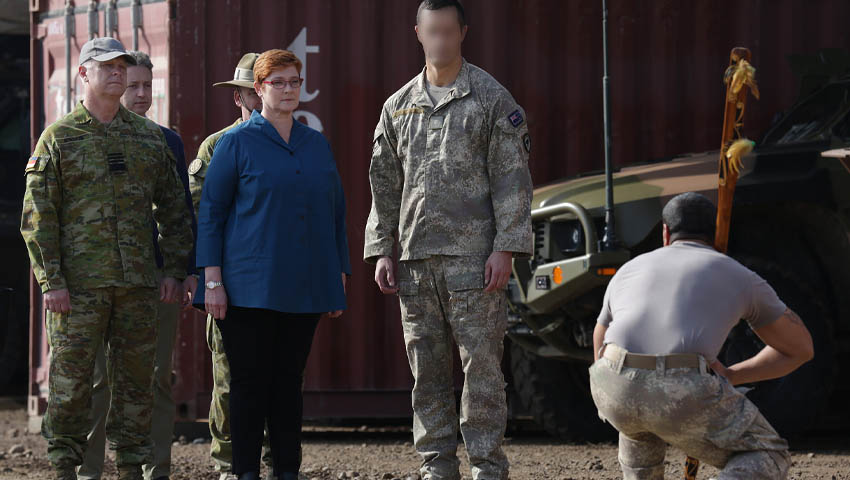“ISIS will be back and the black flags will be back,” said the US’ readiness subcommittee chairman following a high-ranking briefing in Washington, reflecting the concern that Foreign Affairs Minister Marise Payne voiced last week after Turkey’s unilateral military operation into north-eastern Syria.
To continue reading the rest of this article, please log in.
Create free account to get unlimited news articles and more!
John Garamendi, the readiness subcommittee chairman, made his comments in regards to the US' decision to withdraw their armed forces from Syria, which lead to the immediate military operation from Turkey.
The briefing for the House Armed Services Committee (HASC) also raised concerns about how the US should protect Kurds from the invasion by Turkey, as well as discussing the issue of Islamic State militants escaping Kurdish-run prisons.
The issues raised following the HASC briefing are very similar to the concerns voiced by Australa's Foreign Affairs Minister following Turkey's actions.
"The Australian government is deeply troubled by Turkey's unilateral military operation into north-eastern Syria. Actions of this nature will have grave consequences for regional security and could significantly undermine the gains made by the international coalition in its fight against Da'esh, which remains a serious threat to regional peace and security despite its territorial defeat," Minister Payne said in her statement on 10 October.
"The Australian government notes that the Syrian Democratic Forces (SDF) have been steadfast partners for the international coalition in the fight against Da'esh, and have borne a significant share of the sacrifice.
"The government remains concerned for the Australians in these camps but, as we have previously stated, the situation is dangerous and unpredictable, and we will not put Australian officials and the public in danger."
Since this statement, Turkey has agreed to a limited (five days) ceasefire to allow Kurdish-led forces to withdraw from Syria following the meeting of US and Turkish officials in Anakara.
While the agreement allows the peaceful removal of Kurdish forces from the "safe zone", somewhat alleviating safety concerns for the Kurds, it doesn't solve the issue of Islamic State once again rearing its ugly head, nor is it particularly good news for Australians left stuck in detention camps.
In a recently released report from ASPI, titled Shifting frontiers: Addressing post-caliphate terrorism dynamics, which was from the ASPI-KAS 4th Australia-Europe Counter-Terrorism Dialogue forum held in Canberra last year, Dr Günter Krings (Parliamentary State Secretary at the German Federal Ministry of the Interior, Building and Community) warned of the threat of Islamic State after their essential military defeat.
"The territory in Syria and Iraq that was occupied by IS was – and is – used to train terrorists in armed combat and to prepare attacks, also in Europe," Dr Krings said.
"The devastating attacks in Paris and Brussels are tragic examples of their work."
Noting that this was the view of experts even before the disbanding of the US-backed Kurdish forces in Syria, the new unrest following Turkey's invasion will only further help fuel Islamic State's re-emergence.
US SASC emerging threats and capabilities subcommittee chair, senator Joni Ernst, offered legislation to allow the Pentagon close to a month to provide a strategy to prevent the return of IS, which she noted inspired and directed attacks against the US, and once controlled an area larger than the UK.
“In our fast-moving and quickly-changing world, it is easy for some to forget the terrible threat ISIS once posed while they were at their most powerful, but it would be wrong to think we could now allow ourselves to take our foot off of our enemies’ throat,” Senator Ernst said.
Home Affairs Minister Peter Dutton welcomed the news of the ceasefire but still noted that the region was too dangerous for Australian personnel to attempt any rescue missions for displaced Australians.
"The advice is consistent to us, and that is that there's not an opportunity given the danger there at the moment," Minister Dutton said.
"It's a tragedy that parents, mothers and fathers, have made a decision to take children into a theatre of war but we've been very clear we're not going to put Australian Defence, Foreign Affairs or Home Affairs personnel or other agencies' staff at risk."
Over 50 women and children from Australia are currently in the al-Hawl camp, which is near the the border of Iraq and Syria, and is for displaced family members of Islamic State fighters.
Current reports are that 20 women and 44 children are currently in the camp, which has a total population of 70,000.
Australia continues to assess the situation unfolding, but it is clear that both the Australian government and the Pentagon are both seriously concerned about the undoing of the good work that the armed forces have completed in Syria, by Islamic State regaining a foothold in the region just as it seemed like, for the most part, they had been dispatched.
Your thoughts
Get involved with the discussion and voice your thoughts in the comment section about the growing worries of Islamic State making a return to Syria following Turkey's invasion and expelling of Kurdish forces from the region.

 Login
Login







